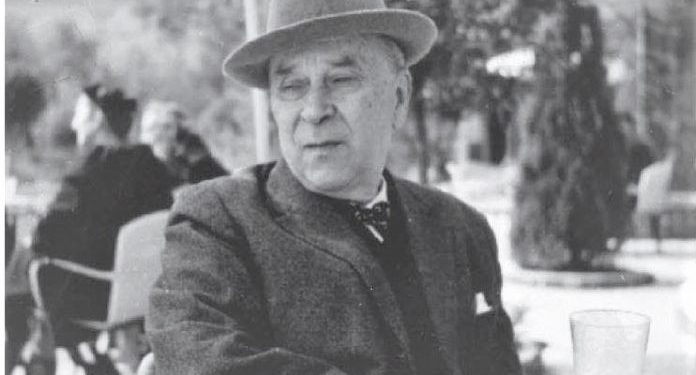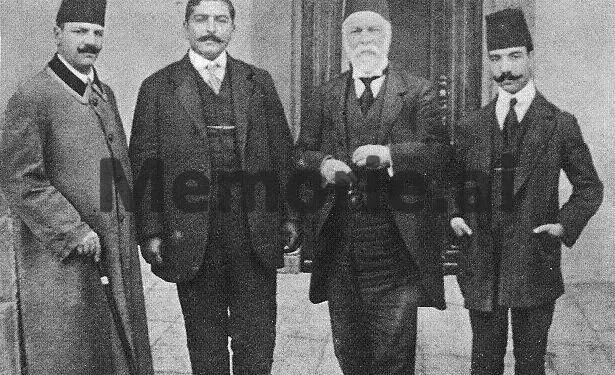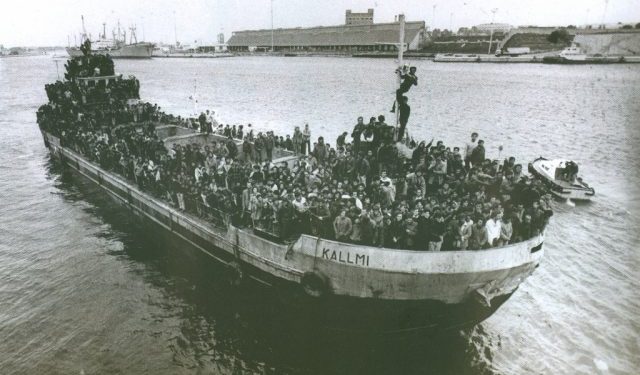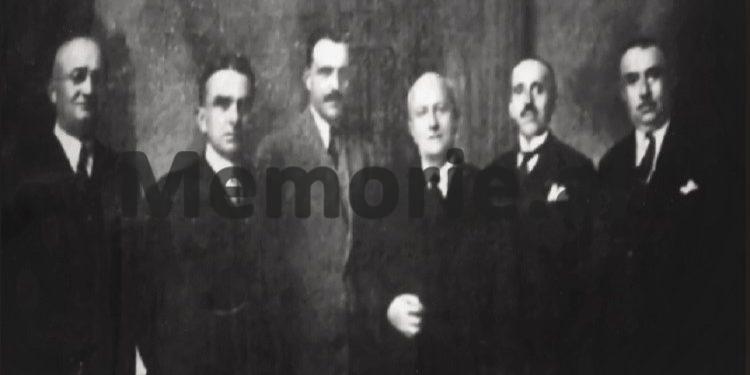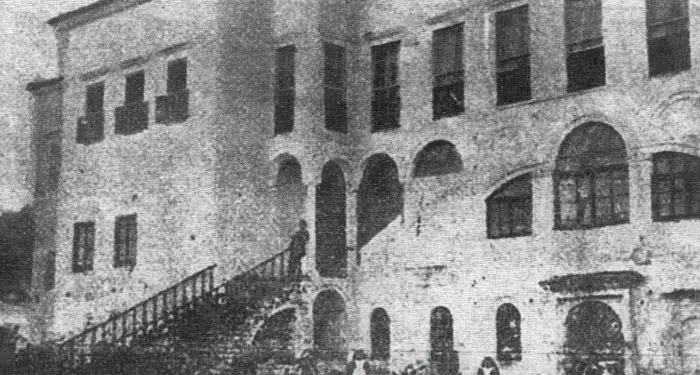By ANI JAUPAJ
-How was the life of the sole heiress of Eqerem bey Vlora, from saraj and servants, to poverty?!-
Memorie.al / The sole heir Eqerem bey Vlorës, (his father Syrjai, the son of Ismail Qemali’s uncle), passed away a few years ago. Once, in this interview, she told us about her life after her father’s departure to Italy, where he worked as a journalist. What he inherited in wealth and in the way of life from the family of great beylers, to whom he belonged. “At the south-eastern entrance of the city of Vlora, at the intersection of many roads, starting from ‘Rruga e Skele’ and leading to the center of the city, in the middle of a large park of 40,000 square meters, surrounded by eight-meter high walls and with two gates in it, it was until 1925, a huge building, with another smaller one in front.
He was the guest house of Vloraje, including the harem (women’s dwelling) and the selamllek (men’s dwelling). But the people simply called this complex; ‘the bey’s palaces’. Here, on December 1, 1885, I was born, the son of Syrja bey Vlora and Mihri hanen Toptan. And as my mother tells me, “I was born with a shirt”, i.e., as a crawler of fate. This popular belief has really brought me luck in my life, but I have never been happy”. These fragments of descriptions from her father’s childhood, the second daughter of Eqerem bey Vlora, Ajnishaja, the only descendant left by him, until a few days ago, had read them, like all of us, from the book “Memories” of written by his father.
She had heard small fragments of him from her mother, in the long years she lived with her and her sister, but she could never hear anything from her father himself. Fate wanted her, that, unlike her father, she was not born “with a shirt”, not to be a crawler of fate, and to feel happy only in the last years, during her old age. This happiness, given by the descendants, who would give her children and, from those material memories, which she would regain again from her father. “The house of the bey”, as it continues to be called, has always been called in Vlora, had passed to the remaining heiress of the family, thus giving her the opportunity to really get into the memories that her father had written down.
Only imagination could help him, as in the photo taken during a dinner in Vienna, where it was selected as the most beautiful “puzzle”, to form the huge fireplace of the living room, the rich library, of which only the wood was left cherry, with moth spots. So, what had he seen in the remaining photographs of the family, and what did he still remember from his mother’s frightened confessions. By the time she was grown up, worthy to sit down with her mother, conversations about her father could only be done through her teeth, controlling her voice so as not to be heard, otherwise, danger could appear at any moment.
Anishane, Eqerem bey Vlora left him so small, that she herself cannot even have a vague idea of his image. Therefore, even when we asked her about family events related to her (those they had told her, which are not part of the memories in his books), she could not build them in a chronological order, but she separated situations or experiences that, despite the years he carries on his shoulders today, they are still in front of his eyes.
Ms. Vlora, beyond the politics of history, do you have any vivid memories of your father?
I can’t have vivid memories, because I was very young when he left Albania. I was only nine months old. My sister, who was almost 12 years older than me, was lucky enough to know her and spend part of her childhood with both parents, while I did not,. In addition, the years that have passed, but also the physical difficulties that I have gone through, have taken their toll, even the stories about him; I no longer have them all in my memory.
Another reason why this happens is because they were told to me, almost in a low voice. After my father left, life became very difficult for us, we moved from one place to another and, in order to stay at this level of living, that is, not to end up even worse, you had to have ‘correct’ behavior, so , the topics around him, should not be frequent. Undoubtedly, no one, under any circumstances, could deny them to us, but we always did them shyly.
Can you bring us some of those stories?
As you may know from history, after the formation of the government of Ismail Qemali, who was my paternal uncle, my father was elected deputy, was a member of the government and has continued since then to be in various leadership positions, as a minister of Foreign Affairs, Minister of Liberated Lands of Kosovo, etc. He was a friend of Fan Noli, even though he had different views with him, he was a friend of Prince Vid, and others like these, which you have probably read. In 1925, he married my oldest, Hadije Vrioni, and after that my sister, Lajla, was born, years later I too. Lajla was born in Rome, while I was born in Albania.
Didn’t Vloraj have tribal ties with Vrionas?
Yes, they had, and in fact my father, it was his turn to have mine at the same time, third cousins. But their marriage was arranged, that’s how it worked back then. It was an assurance on the part of both families that the wealth would remain between them. My father expressed it even years later after the marriage, considering it as a mistake. It has expressly said that; “I shouldn’t have married my cousin.” In fact, the same thing happened with his father, the mother of Eqerem bey, was from the Toptani family…! Yes, the same scheme has worked, which, as you know, was done for the same reasons.
Everyone, except you, has enjoyed the luxuries of the beylers. Your sister only for a few years, but mom yes, because she herself came from the same rank. What did they tell you?
I’m telling you for humor something that happened to me after the 90s, when I went to Italy with my husband, like all other Albanians. We were also among the crowds of people, who were waiting for alms from where to get it. I’m talking about the food that the Italians threw at us, at the time of the exodus. My husband dropped a banana and didn’t know how to eat it. He twisted it around, trying to bite it with all its skin. I had never seen either, but what he told me, I remembered, in the midst of that struggle for survival, my sister’s stories about a tropical fruit that ripened in warm countries. He told me how this fruit was eaten, after the skin had been removed.
It is said that she had tried them since the 30s. I recognized them only from the description and told my husband how he should eat them. This is an episode that we often remember and laugh at. Then, mom told me about the beautiful years of their life. Trips and dinners, where they were invited to different countries in Europe. The good emotions he felt, when he was singled out as the most beautiful of the others, to be photographed. He told me about a dinner in Vienna, when my father was foreign minister. They had approached him to ask for permission, if they could photograph the chosen one of that dinner. You can see that family photo here among others.
Are you sorry that you were not part of these privileges?
Then maybe yes, now that I am well with my family, with my grandchildren, things have changed, albeit too late. Then yes, you must have regrets. For example, during the walks in Tirana, when we were still unsettled, because we didn’t know where we were going to be taken, I used to walk with my mother in front of the Ministry building, where my father had his office. Mine tells me, looking back there, where his office window had been, overlooking the street. In that situation that we were in, where it was not known how we would end up, to have such experiences, it was definitely a shame.
Or the time when they had lived in England for a while and the father asked the mother if she would like to live there forever. Her claims about the time when these things were confessed to me were completely ridiculous and hurtful. “No, he said, I don’t like living here, because I can’t stand the steam through the windows, inside the windows.” He told me that because of the cold, the windows there were double and created steam, which bothered him. Even today, these whims make you laugh.
She could not escape whims. He had left them in the old house and found them in the new one…?
Yes, yes, my grandmother, Mihrije Toptani, was more than that. My mother told me how she had once asked the family’s Italian cook, Jose, to cook polenta for the Arabs, as he called it. And since he was a black woman by nature, he passed by the kitchen, just to catch him by surprise. He did this even when he was looking for the arapash and found Hosena, trying to cook with a spoon, which he put back in the container. Her reaction was immediate, so much so that the cook was fired. After the 90s, we meet Mirto, the worker who used to do the bazaar. His stories, which we already laugh at, of course, are endless.
You can’t count the times that your grandmother returned the meat you bought because she didn’t make it. One of these times, Mirto had met Eqeremin on the street, which, after finding out what happened, told him to sit down, rest for a while on the bench and return home, because he had changed the meat. Mihrija did not even understand anything and praised the second meat. That’s how everyone was saved.
What happened to you after your father left for Italy in 1944?
After deciding to leave, my father took us to my aunt in Tirana, to the former Cuban Embassy. We lived there until the 50s. Mom asked him to take us with him, but he was afraid of the unexpected sea and bad weather and didn’t take us. After they removed us from our aunt, we went to Babrru, to a cousin of ours, and then to Durrës. They didn’t leave us there either, until we ended up in Kavaja, where we were able to find accommodation and where, finally, people were not treating us like in the previous places where we had been, they were good to us.
Meanwhile, you had news from your father, what had happened to him?
The father had gone to Italy, where he continued to stay for 10 years, working as a journalist at Rai-Uno. In the early days we knew nothing, except that he was alive, because all the letters or packages he sent were returned. They were allowed only for a while in the 60s, and then they were discontinued again. He sent short letters with a pseudonym, postcards, where he wrote quite simply.
With what nickname, do you remember?
Yes, as I recall, we had all our hopes there. His signature was Adalxiza Rosi.
How did you build your life in Kavaje?
We lived on the little we could get from my father, some money, he sent us through my aunt’s daughter, who also lived in Italy. We finished school, until the end of high school. Then I, unlike my friends, started working in a nursery. The sister worked in construction, but died at a young age, from flu, since then it was called “Hong Kong”.
After her death I got sick and had bad years. Mine asked me for a job in the Central Committee, where he shot a Vlonjat who helped him. Even I, after I got better, was introduced to work in ceramics, at the Kavaja Artistic Center, where I worked until I retired. That’s where I got married and started my family. Mom died in 1984.
From your father until when did you have news? What happened to him after leaving Italy?
After getting a little old, the father moved to Vienna, where he worked as a journalist, but with less time. He lived there with his mother’s sister, who was Hëna Këlcyra’s mother, until she died at the age of 78, of a heart attack.
Can you tell us a little about the history of the flag that Eqerem bey Vlora brought from France?
According to the legends, when the father was in France, he met a young man, who was from the tribe of Skenderbeu, his name was Aldo Kastrioti. He gave her a flag, which my father put in a frame and kept at home, even in the bedroom, as my mother told me. In ’12, when the flag was going to be raised, Ismail Qemali was told this and he sent Eqerem home to get the red and black flag.
The father had told him that he could only lend them this flag, however he had told them that in the “Muradije” neighborhood, there was a Marigo that embroidered very beautifully. Based on this pattern, she could embroider the flag they wanted. And that’s how it sounded…! His library, if not as flag, has been quite heard, for wealth.
So much so that in that house that is yours today, it was the city library for years. What was left of it when you repossessed the house?
The father knew 11 languages, so you can guess what diverse literature was on the shelves of his house. It was said that his library was one of the best in the Balkans. After the 1990s, only the destroyed furniture was left of it. A part of them is said to have been taken by Yugoslavia in 1945, while the rest may be in Tirana. It has mainly been rich in encyclopedias. Through acquaintances, we learned that some of them are also in Vlora. Lately, it has even been discovered that the ‘Dance of Swords’ is in the Museum of Vlora. Memorie.al




